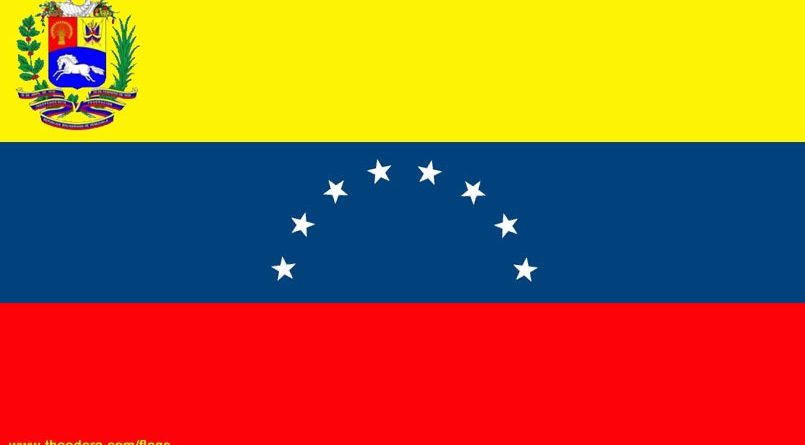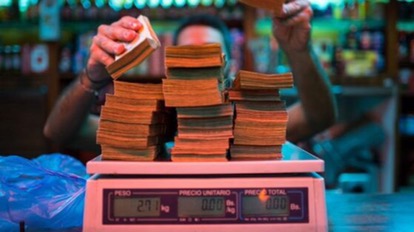At a delicatessen counter in eastern Caracas, Humberto Gonzalez removes slices of salty white cheese from his scale and replaces them with a stack of bolivar notes handed over by his customer. The currency is so devalued and each purchase requires so many bills that instead of counting, he weighs them. “It’s sad,” Gonzalez says. “At this point, I think the cheese is worth more.”
It’s also one of the clearest signs yet that hyperinflation could be taking hold in a country that refuses to publish consumer-price data on a regular basis. Cash-weighing isn’t seen everywhere but is increasing, echoing scenes from some of the past century’s most-chaotic hyperinflation episodes: Post-World War I Germany, Yugoslavia in the 1990s and Zimbabwe a decade ago.
“When they start weighing cash, it’s a sign of runaway inflation,” said Jesus Casique, financial director of Capital Market Finance, a consulting firm. “But Venezuelans don’t know just how bad it is because the government refuses to publish figures.”
Piles in Gym Bags
Once one of the world’s strongest currencies, the bolivar has been reduced to a nuisance. Basic purchases require hundreds of bills. Shoppers shove piles of them into gym bags before venturing into crime-plagued streets and shopkeepers stash thousands in boxes and overflowing drawers. In the absence of official data, economists are left to guess what the inflation rate is. Estimates for this year range from 200 percent to 1,500 percent.
Until now, as the bolivar sank, the government declined to print bigger-denomination bills. The 100-bolivar note — the nation’s largest — is worth less than a dime. A few weeks ago, however, the government quietly asked five currency companies to submit bids for bigger bills — 500, 1000, 5000, 10,000 , and perhaps a 20,000-bolivar note, according to someone with direct knowledge of the order.
The request is for the bills to be ready in time for Christmas bonuses. Normally such an order takes four to six months and so far no tender has been awarded. To minimize time and cost, the government is considering swapping only the color, not the design, of existing bills, and adding zeros, the person said. The Central Bank said it had no comment.
‘Raising the White Flag’
Steve Hanke, an economist at Johns Hopkins University, said re-denominating banknotes is “raising the white flag. No one wants to do it, but eventually their hand gets forced.” For now, many Venezuelans live a kind of paradox: they are awash in cash but can rarely afford to buy anything.
In truth, even getting hold of enough legal tender has become an ordeal. Before embarking on their shopping odysseys, weary consumers face long waits at the bank where dwindling numbers of cash machines have strict limits.
Data from the Central Bank show that despite the increased need for bank machines, their numbers have been declining. And whereas only two years ago a typical ATM was restocked every few days, now it occurs every few hours. In addition, many small towns have no machines at all and some 40 percent of the population have no bank accounts, according to Casique.
Permanent Bottleneck
Many, like Jose Marcano, a 26-year-old office messenger, find themselves caught in a permanent bottleneck. Marcano spends hours each week depositing his employer’s cash which he carries in black plastic bags on his motorbike. When he can’t make it to an ATM, he flies through stop signs and traffic lights, afraid of getting robbed.
“Carrying this amount of cash is incredibly dangerous,” he said while feeding stacks of bolivars into an ATM. “You put your life at risk.”
While there are credit and debit cards in Venezuela, government data show that more than a third of the labor force is informal, meaning they mostly work for cash. That includes taxi drivers, street hawkers and a slew of service jobs. In addition, state pensions to the elderly are generally paid in cash.
Authorities have recently taken a small step to ease the cash crunch, allowing consumers to use bank cards to withdraw legal tender from convenience stores and pharmacies.
Feeling Like Pablo Escobar
Many say that will only saddle Venezuelans with even more bills until authorities print higher denominations.
Meanwhile, people like Bremmer Rodrigues, 25, who runs a bakery on Caracas’ outskirts, are at a loss over what to do with their bags of bills. Every day his business takes in hundreds of thousands of bolivars, which he hides around his office until packing them up in boxes to deposit at the bank. He says if someone looked in on him, he might be mistaken for a drug dealer.
“I feel like Pablo Escobar,” he said. “It’s a mountain of cash, every day more and more.”





